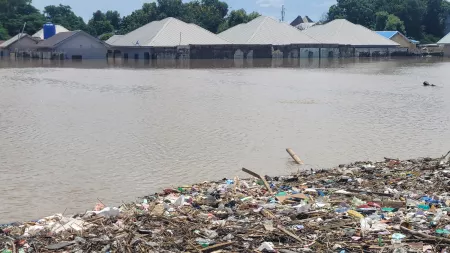Devastating flash floods have swept across the Northeastern region of Nigeria (in Maiduguri Metropolitan Council (MMC) and Jere Local Government Areas (LGAs)) affecting hundreds of thousands of people, submerging thousands of homes, and destroying property and other infrastructure worth billions of Naira. On the night of September 10, the torrential rains caused the Alau Dam in neighboring Konduga LGA to breach its banks in Bama, Damboa, and Gwoza LGAs.
According to the UN, as of September 10, over 414,000 people have been affected, 58 people have been injured, and at least 37 people have been killed. Approximately 40,000 people have been registered at three internally displaced persons (IDPs) camps, originally housing those fleeing violence. As assessments continue, the number of affected individuals is expected to increase.
“This is a catastrophic blow to a state already suffering from over a decade of violent conflict that has weakened systems and infrastructure."Dr. Hussaini Abdu, Country Director, CARE Nigeria
The disaster – exacerbated by climate change – will also worsen the ongoing food and nutrition crisis in the country. Moreover, prior to the flooding, 4.8 million people were in dire need of humanitarian assistance in the northeast of Nigeria.
“This is a catastrophic blow to a state already suffering from over a decade of violent conflict that has weakened systems and infrastructure. It's the worst flood Maiduguri has experienced in more than 30 years. Families are being displaced, internally displaced person (IDP) camps are swelling, and hundreds of thousands are now in urgent need of assistance. This number is expected to rise in the coming days. Our hearts go out to all affected” said Dr. Hussaini Abdu, Country Director of CARE Nigeria.
"It's the worst flood Maiduguri has experienced in over 30 years."Dr. Hussaini Abdu, Country Director, CARE Nigeria
Access to many areas remains severely restricted, disrupting vital supply chains and services, including schools, healthcare facilities, and markets. Additionally, the telecommunications and electricity networks have been compromised in some locations. Flooding now covers more than 40% of Maiduguri, a city with an estimated population of over 870,000, including vulnerable populations in the Muna and Jere IDP camps.
The immediate needs of those affected include food, shelter, clean water, and essential Water, Sanitation, and Hygiene (WASH) supplies. Protection remains a significant concern, particularly for women, girls, unaccompanied children, older persons, and people living with disabilities. Non-food items (NFIs) and interventions to prevent waterborne diseases such as cholera in congested IDP sites are urgently required. The flooding has also disrupted operations at nutrition stabilization centers, which treat severely malnourished children in MMC and Jere LGAs, emphasizing the need for continued nutritional support to prevent relapses.
CARE and partners' response in Nigeria
CARE Nigeria is mobilizing a response to the flooding, targeting vulnerable populations – including women and girls. CARE will provide food, water/sanitation services, and other non-food items. Additionally, CARE will work alongside local partners to provide protection and psychosocial support to reduce the risk of gender-based violence, including sexual violence, that often arise in emergency situations.
For media inquiries, contact Habeeb Sulaiman, CARE Nigeria Communications Lead, [email protected], or email [email protected].
